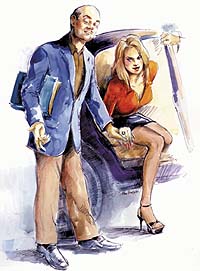
It's the testosterone, man
Experts believe male midlife crisis may be medical, not psychological
Wed, April 19, 2006
 |
|
While flashy cars and affairs with younger
women are part of the image of male midlife crisis, Dr. Shafiq Qaadri
sees it as a medical issue linked to dropping testosterone levels.
|
CRISIS. The Chinese have a picture word for it -- two words combined: Danger and opportunity.
How apt this is when applied to mid-life crisis -- especially the male crisis, the male menopause, or andropause as it's labelled nowadays.
The butt of jokes for generations, the male mid-life crisis has always been presented as a wild time when a man "flies off the rails" -- maybe has an affair with a younger woman, changes his image, gets into fitness, dumps his job and buys a sports car.
It can be a desperate time, especially for his wife.
In fact, Pat Gaudette, co-author with Gay Courter of How to Survive Your Husband's Midlife Crisis: Strategies and Stories from the Midlife Wives Club, states firmly "It's his wife who's in crisis. Not him." She argues that, most likely, up until then he was a faithful, decent husband, kind to his wife and kids, and successful at work.
"In the past, women were more apt to sit and accept what was happening as they were economically dependent on their husband and feared the stigma and devastation of divorce," says Gaudette.
She points out what we all know today -- that divorce is far more common and "women will no longer sit and accept things such as unacceptable behaviour and, especially, cheating."
But it was also believed until recently, even by the medical profession, that a male midlife crisis was a psychologically based change brought on by building frustration and overload of responsibilities.
That view has been overturned in recent years as it is now understood that midlife crisis (for men and women) is physiological as well as psychological.
Physiologically it's now accepted that andropause is similar to women's menopause -- the fact we're in bodies built for a shorter lifespan and more specifically, a drop in hormonal activity. Or, in the case of men, one particular master hormone -- testosterone.
It's only recently that testosterone has appeared in the forefront of male midlife study as the medical establishment realizes its vast importance. It comes along with a surge of interest in men's mid-life sexuality as men (especially Boomers) demand to know the answers to erectile dysfunction, an increasingly common complaint.
This resulted in deeper scrutiny of the problem and in the creation of the wildly successful Viagra. But Toronto preventative family physician Dr. Shafiq Qaadri is convinced it's testosterone that holds the true answer for men looking for a healthy, vital, virile and fertile midlife.
"Men must be made aware of the testosterone factor," he says, "and realize how toxic the modern lifestyle and environment is to them."
He points out, for instance, that men's sperm counts are half what they were a generation ago, due, he says, to stress and environmental factors. "Stress hormones are toxic to the testosterone system." And he's put his considerable knowledge, theories, information and helpful advice into The Testosterone Factor: A Practical Guide to Improving Vitality and Virility, Naturally, a new book being eagerly snapped up by men all over the world.
Also a broadcaster and MP for Etobicoke North, Dr. Qaadri is an intelligent, articulate writer, showing how to not only harness this super-hormone naturally but help make a man's health and wellbeing last as long as his life span.
But despite the obvious medical implications of andropause, both he and Pat Gaudette strongly emphasize the importance of a wife's emotional support during this time in a man's life. Dr. Qaadri put it simply: "Communication and openness about any problems between them is absolutely essential."
Gaudette agrees, and says it's also important that a woman understands this
is a specific journey a man has to take and she has to decide whether she is
going to be part of it. This can mean embracing the "opportunity"
rather than fearing the "danger" of the Chinese picture word.